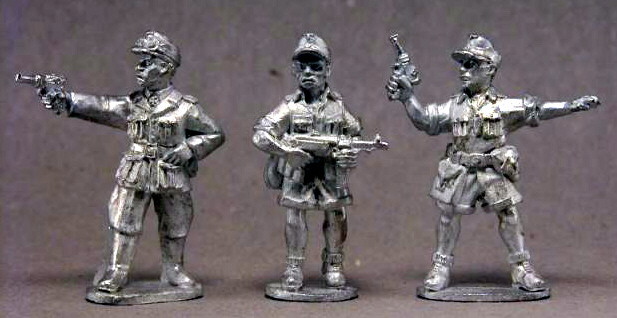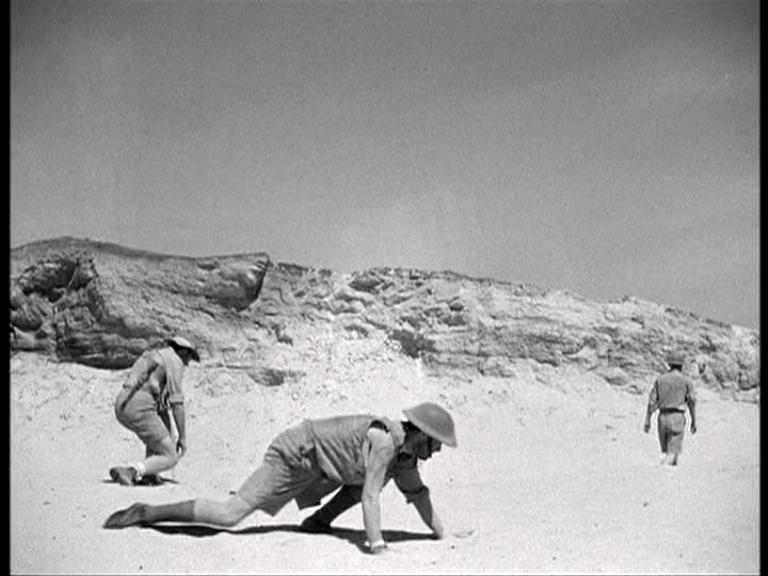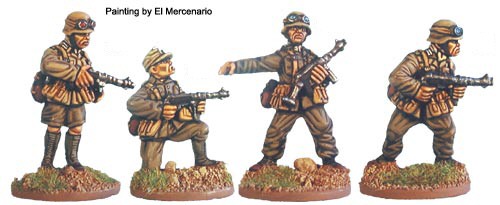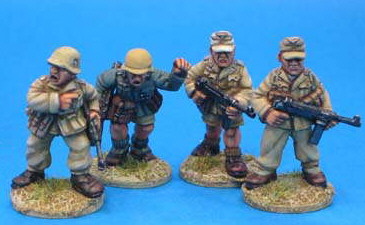 His chance for real military power came when Hitler, appointed chancellor in 1933, recognised his ability. By 1938, Rommel was a senior military figure in the Wehrmacht. His success in the campaigns of 1939
His chance for real military power came when Hitler, appointed chancellor in 1933, recognised his ability. By 1938, Rommel was a senior military figure in the Wehrmacht. His success in the campaigns of 1939 
The nickname ‘Desert Fox’ was well deserved. Rommel was highly respected even by the British. Auchinleck, Rommel’s opposite until his sacking by Churchill, sent a memo to his senior commanders in North Africa, to state that it was their responsibility to ensure that their men thought less of Rommel as a ‘super military leader’ and more of him as a normal German commander.Rommel’s fame in the desert rests on his success as a leader and also his uncompromising belief that all prisoners of war should be well looked after and not abused. One story told at the time was that Italian troops took from British POWs’ their watches and other valuables. When Rommel found out, he ordered that they be returned to their owners immediately. To many British ‘Desert Rats’, Rommel epitomised a gentleman’s approach to a deadly issue – war.
to state that it was their responsibility to ensure that their men thought less of Rommel as a ‘super military leader’ and more of him as a normal German commander.Rommel’s fame in the desert rests on his success as a leader and also his uncompromising belief that all prisoners of war should be well looked after and not abused. One story told at the time was that Italian troops took from British POWs’ their watches and other valuables. When Rommel found out, he ordered that they be returned to their owners immediately. To many British ‘Desert Rats’, Rommel epitomised a gentleman’s approach to a deadly issue – war. Rommel knew that his options at the vital battles at El Alamein were limited. Montgomery, who succeeded the dismissedAuchinleck, had the advantage of Bletchley Park feeding him the battle plan Rommel was going to use. Rommel was also seriously starved of the fuel he needed for his attack on Montgomery’s ‘Desert Rats’.
Rommel knew that his options at the vital battles at El Alamein were limited. Montgomery, who succeeded the dismissedAuchinleck, had the advantage of Bletchley Park feeding him the battle plan Rommel was going to use. Rommel was also seriously starved of the fuel he needed for his attack on Montgomery’s ‘Desert Rats’.  The second battle at El Alamein was a very fluid battle but the sheer weight of supplies that Montgomery had access to (amongst other equipment were 300 new Sherman tanks) meant defeat for Rommel.
The second battle at El Alamein was a very fluid battle but the sheer weight of supplies that Montgomery had access to (amongst other equipment were 300 new Sherman tanks) meant defeat for Rommel. _04.jpg) The defeat of the Afrika Corps was the first major setback for Hitler and the Wehrmacht. Hitler ordered Rommel to fight to the last man and the last bullet. Rommel had far too much respect for his men to obey this command and retreated. The Germans left North Africa in May 1943. Despite this refusal to obey Hitler’s command, Rommel did not lose favour with Hitler.
The defeat of the Afrika Corps was the first major setback for Hitler and the Wehrmacht. Hitler ordered Rommel to fight to the last man and the last bullet. Rommel had far too much respect for his men to obey this command and retreated. The Germans left North Africa in May 1943. Despite this refusal to obey Hitler’s command, Rommel did not lose favour with Hitler.
 to state that it was their responsibility to ensure that their men thought less of Rommel as a ‘super military leader’ and more of him as a normal German commander.Rommel’s fame in the desert rests on his success as a leader and also his uncompromising belief that all prisoners of war should be well looked after and not abused. One story told at the time was that Italian troops took from British POWs’ their watches and other valuables. When Rommel found out, he ordered that they be returned to their owners immediately. To many British ‘Desert Rats’, Rommel epitomised a gentleman’s approach to a deadly issue – war.
to state that it was their responsibility to ensure that their men thought less of Rommel as a ‘super military leader’ and more of him as a normal German commander.Rommel’s fame in the desert rests on his success as a leader and also his uncompromising belief that all prisoners of war should be well looked after and not abused. One story told at the time was that Italian troops took from British POWs’ their watches and other valuables. When Rommel found out, he ordered that they be returned to their owners immediately. To many British ‘Desert Rats’, Rommel epitomised a gentleman’s approach to a deadly issue – war. Rommel knew that his options at the vital battles at El Alamein were limited. Montgomery, who succeeded the dismissedAuchinleck, had the advantage of Bletchley Park feeding him the battle plan Rommel was going to use. Rommel was also seriously starved of the fuel he needed for his attack on Montgomery’s ‘Desert Rats’.
Rommel knew that his options at the vital battles at El Alamein were limited. Montgomery, who succeeded the dismissedAuchinleck, had the advantage of Bletchley Park feeding him the battle plan Rommel was going to use. Rommel was also seriously starved of the fuel he needed for his attack on Montgomery’s ‘Desert Rats’.  The second battle at El Alamein was a very fluid battle but the sheer weight of supplies that Montgomery had access to (amongst other equipment were 300 new Sherman tanks) meant defeat for Rommel.
The second battle at El Alamein was a very fluid battle but the sheer weight of supplies that Montgomery had access to (amongst other equipment were 300 new Sherman tanks) meant defeat for Rommel. _04.jpg) The defeat of the Afrika Corps was the first major setback for Hitler and the Wehrmacht. Hitler ordered Rommel to fight to the last man and the last bullet. Rommel had far too much respect for his men to obey this command and retreated. The Germans left North Africa in May 1943. Despite this refusal to obey Hitler’s command, Rommel did not lose favour with Hitler.
The defeat of the Afrika Corps was the first major setback for Hitler and the Wehrmacht. Hitler ordered Rommel to fight to the last man and the last bullet. Rommel had far too much respect for his men to obey this command and retreated. The Germans left North Africa in May 1943. Despite this refusal to obey Hitler’s command, Rommel did not lose favour with Hitler.
In February 1944, Rommel was appointed by Hitler to be commander of the defences of the Atlantic Wall. Rommel’s brief was to ensure that Western Europe was impregnable.
He took full responsibility for the Northern French coastline.

The beaches at Normandy were littered with his anti-tank traps which were invisible at full-tide.
As it was, the planning at D-Day meant that Rommel’s defences were of little problem to the vast Allied attack. At the time of D-Day, Rommel commanded the important Army Group B. black tree
As it was, the planning at D-Day meant that Rommel’s defences were of little problem to the vast Allied attack. At the time of D-Day, Rommel commanded the important Army Group B. black tree

On July 17th 1944, Rommel was wounded in an attack on his car by Allied fighter planes. The attack took place near St. Lo. artizan

Rommel was implicated in the July 1944 Bomb Plot against Hitler and the Gestapo was keen to interview this famous military commander. Hitler was keen to avoid the public show trial of his most famous general and it seems that a 'deal’ was done. Rommel died ‘of his wounds’ on October 14th 1944. He was given a state funeral. But it seems that he committed suicide to a) save himself from a humiliating show trial and b) it seems that Hitler promised that his family would not be punished for Rommel’s indiscretions if he died ‘of his wounds’. battle honours

What impact Rommel would have had on the Allies drive to Germany after D-Day is difficult to speculate. However, the sheer odds against the Wehrmacht and Luftwaffe post-June 1944 were such that this famous commander would have been unable to hinder the Allies progress.
chiltern
 An M3 Lee tank, commanded by U.S. Army Sergeant First Class Joe Gunn (Humphrey Bogart) and nicknamed Lulu Belle, becomes separated from its unit during a general retreat from Rommel's forces. At a bombed-out field hospital, the crew picks up a motley collection of stragglers, among them a British doctor, four assorted Commonwealth troops, and a Free French corporal (Louis Mercier). Later, they pick up a Sudanese sergeant major (Rex Ingram) and his Italian prisoner (J. Carrol Naish), who volunteeers to lead them to a well at Hassan Barani. En route, a Luftwaffe pilot (Kurt Kreuger) strafes the tank, killing one of the British soldiers (Lloyd Bridges), but is shot down and captured. Arriving at the well, they find it completely dry.
An M3 Lee tank, commanded by U.S. Army Sergeant First Class Joe Gunn (Humphrey Bogart) and nicknamed Lulu Belle, becomes separated from its unit during a general retreat from Rommel's forces. At a bombed-out field hospital, the crew picks up a motley collection of stragglers, among them a British doctor, four assorted Commonwealth troops, and a Free French corporal (Louis Mercier). Later, they pick up a Sudanese sergeant major (Rex Ingram) and his Italian prisoner (J. Carrol Naish), who volunteeers to lead them to a well at Hassan Barani. En route, a Luftwaffe pilot (Kurt Kreuger) strafes the tank, killing one of the British soldiers (Lloyd Bridges), but is shot down and captured. Arriving at the well, they find it completely dry.Now running out of water, they are forced to detour to a desert well marked on Gunn's map. They find it, but it is almost empty, providing only a trickle of water. A German half track arrives soon afterwards and Gunn's group ambushes it. Gunn finds out from the two survivors of its crew that a German battalion, desperate for water, is following close behind. He decides to make a stand to delay the Germans any way he can, while he sends one of his men, Waco (Bruce Bennett) away in the captured German vehicle in search of help. The two Germans are released, to carry back an offer: "food for water", even though there is barely enough for Gunn's men. Gunn then changes the deal to "guns for water".

The well has completely dried up by the time the Germans arrive. A standoff and battle of wills begins. Gunn pretends the well is full of water and negotiates to waste time. Eventually, the Germans attack and are beaten off again and again, but one by one, the defenders are killed.
 However, the thirst-maddened Germans' final assault turns into a full-blown surrender as they drop their weapons and claw across the sand towards the well.
However, the thirst-maddened Germans' final assault turns into a full-blown surrender as they drop their weapons and claw across the sand towards the well.  To Gunn's shock, he discovers that a German shell that exploded in the well has refilled it by tapping into another source of water.
To Gunn's shock, he discovers that a German shell that exploded in the well has refilled it by tapping into another source of water.  Gunn and the only other Allied survivor disarm the Germans while they're drinking their fill and start marching them east, where they encounter Allied troops led by Gunn's courier Waco,
Gunn and the only other Allied survivor disarm the Germans while they're drinking their fill and start marching them east, where they encounter Allied troops led by Gunn's courier Waco, who had managed to reach them. The movie ends with news of the allied victory at the First Battle of El Alamein, turning back the tide of Rommel's Afrika Corps.
who had managed to reach them. The movie ends with news of the allied victory at the First Battle of El Alamein, turning back the tide of Rommel's Afrika Corps.
No comments:
Post a Comment